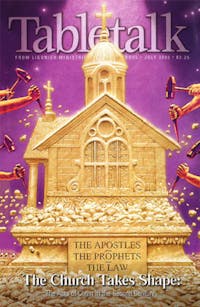
Request your free, three-month trial to Tabletalk magazine. You’ll receive the print issue monthly and gain immediate digital access to decades of archives. This trial is risk-free. No credit card required.
Try Tabletalk NowAlready receive Tabletalk magazine every month?
Verify your email address to gain unlimited access.
There I was, addressing the crowd at Ligonier’s annual National Conference. Things were going just swimmingly. The speakers who had preceded me had done an outstanding job. I had things to add that would complement that wisdom. I knew what I wanted to say, and it wasn’t coming out all stutters. Then, as I turned my back to the several thousand people to write something on the board, a bright flash of light caught my eye. I looked up toward the massive video screen above me, and there I saw the source of that flash. It was the gaping bald spot on the back of my head. I groaned. I was no longer at ease.
If you were to ask me whether I am balding, I would answer right away that such is the case. The difficulty is that when I picture myself in my mind’s eye, I have a full head of hair. My self-image doesn’t match the reality. If you were to ask some people whether I am bald, they would certainly agree. But they would be wrong. There are still a few brave soldiers dug in deep up there. So this image of me is likewise off.
In the second century after our Lord’s birth, the church set about the business of establishing its own self-perception. But it was forced to do so in circumstances far more troubling than my receding hairline. Within its ranks, assorted heresies were vying to be considered the faith once delivered to the saints. From the outside, assaults were coming from both Jewish and Greek thought. The battle was on for the identity of the church.
Several New Testament writers, however, gave us a reminder of the nature of the church in the language they chose. Sometimes when our Bibles say church, the original Greek word is ekklesia, the “called-out ones.” This reminds us that our identity is not determined by those outside the church. The other Greek word translated church in our Bibles is kuriake, which literally means “belonging to the Lord.” It is neither the world around us nor we ourselves who determine our image, but our Bridegroom, Jesus Christ.
We are again in the midst of an identity crisis. We are again attacked from within and without. But it is happening coram Deo, before the face of God. We rest in His hands without fear, for He loves us as His bride. We are in the care of Him who has numbered the very hairs on our heads.
